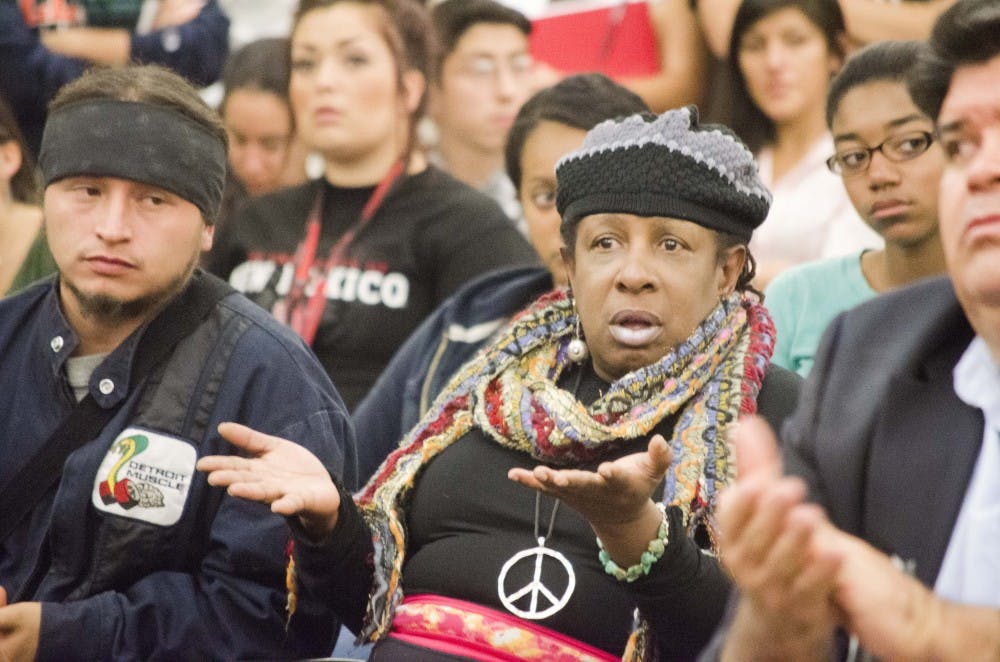news@dailylobo.com
@ArdeeTheJourno
UNM’s decision to alter requirements for the Bridge Scholarship earlier this semester sparked a heated faceoff between University administrators and enraged community members.
In a Bridge Scholarship forum Wednesday afternoon, more than 100 people voiced negative reactions to the raised GPA requirement for the now $1,500 scholarship.
This semester, UNM posted on its website that it had decided to raise the minimum GPA requirement for fall 2014 for the Bridge from 2.5 to 3.0. This accompanies an ACT requirement of 23, which was not changed. UNM posted the changes on its website without communicating it publicly.
Virginia Necochea, a member of the New Mexico Coalition for Equity and Justice, who was one of the organizers of the event, said the organization organized the forum after discovering the changes on UNM’s website Monday. She said the University did not inform the campus community beforehand.
“UNM is a public institution, yet the public was not part of the decision making process that resulted in the recent changes to the Bridge to Success scholarship,” she said. “This action has raised great concerns from various union-based programs…especially when the decisions will have an impact on the underserved and underrepresented students in New Mexico.”
The University also created the new Success Grant for first-semester students, which amounts to $1,000 and would require a GPA of at least 2.5 with no ACT requirement. The grant would also require a Free Application for Federal Student Aid (FAFSA).
According to a press release, UNM initially planned to put a GPA requirement of 3.0 for the Success Grant but decided this week to lower it to 2.5 for one more year “while communicating the changes to future students and families.” First-semester students can receive either the Bridge Scholarship or the Success Grant — they cannot receive both.
Necochea said these changes would hurt students of color the most because they are underrepresented by the UNM administration.
Ralph Arellanes, director of the New Mexico League of United Latin American Citizens, said that because many recipients of the Bridge are students of color, the changes made would take away aid from minority citizens.
“This is segregation,” he said. “This is not about creating a better institution or inclusiveness. It is exclusiveness. It is elitist. It is discrimination. There is no question about that.”
And the discrimination has persisted starting from UNM’s decision making process, he said.
“This policy, this decision was made in a vacuum, a vacuum of maybe two or three people that did not include our community,” he said. “It certainly did not include communities of color. It did not consider the majority of students that attend UNM today.”
Get content from The Daily Lobo delivered to your inbox
Christopher Ramirez, a UNM graduate student, said UNM’s move makes the Bridge more of a merit-based scholarship. This is discriminative, he said.
“I’m scared of the merit talk because I think that merit is code for whites,” he said. “As a mentor, organizer and educator, it’s the students who score the lowest who fight to be here.”
UNM Provost Chaouki Abdallah apologized to the flustered audience in the event.
“We screwed up on the communications,” he said. “We should have discussed it first. I’m sorry for not communicating with the groups and for disrespecting you.”
Abdallah said he attended the forum UNM President Frank’s stead, who is in New York.
Still, Abdallah defended that UNM did not mean to be discriminative through its decision to change the Bridge’s GPA requirement.
“Nobody in here, not me, not Dr. Frank, is about exclusion,” he said. “So let’s get it out of the way. If we were to carry out under the model that came out, we would have lost money from the University. The people who are not continuing with the University of New Mexico, they’re leaving with debt.”
UNM Associate Vice President Terry Babbitt said the change will have equal impact among white students and students of color.
“What the institution is doing to get the data and to do the best we can to help students,” he said. “Essentially the ethnic impact, just with the 3.0, is fairly proportional.”
According to a PowerPoint presentation Babbitt presented at the forum, 30.9 percent of white recipients of the Bridge have GPAs of below 3.0, and so will be impacted by the new requirements.
Comparatively, 37.8 percent of African American recipients and 35.1 percent of Hispanic recipients fall on the same spectrum.
But Babbitt said the change will help UNM to attract more academically excellent high school students in the state.
“UNM does have a goal to attract more of those top students in the state,” he said. “We want them to stay in the state. Right now, we enroll 23 percent of those students in that category. We should attract, not at the expense of anyone else but the University, more of those students. That’s one of the goals.”
Still, Babbitt apologized to the audience for the miscommunication.
But Arellanes said he would not accept the administrators’ apologies. His statements were followed by audience applaud.
“We’re not sure if we’re accepting your apology,” he said. “We haven’t even decided to call for your resignation because this kind of policy is discrimination…You all have lobbyists. You all are connected with legislators. This work can change a lot. The next time we have something like this, it will be five times as large. And they’ll be calling for your job, your job and Frank’s job.”
Necochea said her organization urges UNM to be more transparent about the changes and to involve the Office of Equity and Inclusion in decision making about financial aid.
She also said she wants to the University to guarantee that the new Success Grant be available to undocumented students and stay with its declared requirements.
“Instead of forcing students out, the University needs to address the real issue at hand — transparency,” she said. “We’re asking…key administrators to uphold the following recommendations. As a minority-serving institution, we have a golden opportunity to model inclusive excellence for the nation.”
Arellanes said that next time, the University should involve the campus community with decision making if it wants to avoid legal trouble.
“We demand that any policy change…come to us first before anybody,” he said. “We should know before the regents do. And if that doesn’t happen, I’ll be the first to file a lawsuit.”






